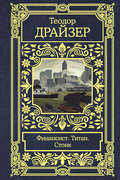
Теодор Драйзер
Финансист / The Financier
“What'd I tell you, Cowperwood?” he asked. “He has stuff in him, that youngster. Look out for him.”
Mrs. Cowperwood looked at her boy curiously at dinner. Was this the son she had nursed at her bosom not so very long before? Surely he was developing rapidly.
“Well, Frank, I hope you can do that often,” she said.
“I hope so, too, ma,” was his reply.
Auction sales were not every day, however, and his home grocer was open to the transactions not every time, but from the very first young Cowperwood knew how to make money.
He took subscriptions for a boys' paper; sold a new kind of ice-skate, and once organized a band of neighborhood youths into a union for the purpose of purchasing their summer straw hats. It was not his idea that he could get rich by saving. From the first he had the notion that spending was better.
It was in this year, or a little earlier, that he began to take an interest in girls. Being good-looking and magnetic himself, it was not difficult for him to attract the sympathetic interest of those in whom he was interested. A twelve-year old girl, Patience Barlow[19], who lived nearby, was the first to attract his attention or be attracted by him. She was a Quakeress, the daughter of Quaker parents. However, she liked this self-reliant, self-sufficient, straight-spoken boy.
One day, after an exchange of glances from time to time, he said, with a smile and the courage that was innate in him: “You live nearby, don't you?”
“Yes,” she replied, a little flustered, “I live at number one-forty-one.”
“I know the house,” he said. “I've seen you go in there. You go to the same school my sister does, don't you? Aren't you Patience Barlow?” He had heard some of the boys speak her name.
“Yes. How do you know?”
“Oh, I've heard,” he smiled. “I've seen you. Do you like licorice?”
He fished in his coat and pulled out some fresh sticks.
“Thank you,” she said, sweetly, taking one.
“Don't you know my sister, Anna Cowperwood?” he recurred. “She's in a lower grade than you are, but I thought maybe you might have seen her.”
“I think I know who she is. I've seen her coming home from school.”
“I live right over there,” he confided, pointing to his own home, as if she didn't know.
“Do you know Ruth Merriam[20]?” she asked.
“No, why?”
“She's giving a party next Tuesday.”
“Where does she live?”
“There in twenty-eight.”
“I'd like to go,” he affirmed, warmly.
“Maybe she'll invite you, I'll ask her.”
“Thanks,” he smiled.
And she began to run gayly onward.
He looked after her with a smiling face. She was very pretty. He felt a keen desire to kiss her.
This was just one of the early love affairs, or puppy loves. Patience Barlow was kissed by him many times before he found another girl – Dora Fitler[21], when he was sixteen years old and she was fourteen; and Marjorie Stafford[22], when he was seventeen and she was fifteen. Dora Fitter was a brunette, and Marjorie Stafford was fair, with bright-red cheeks, bluish-gray eyes, and flaxen hair.
It was at seventeen that he decided to leave school. He had not graduated. He had had enough. Ever since his thirteenth year his mind had been on finance. His Uncle Seneca had allowed him to act as assistant weigher at the sugar-docks in Southwark. In certain emergencies he was called to assist his father, and was paid for it. He even made an arrangement with Mr. Dalrymple to assist him on Saturdays; but when his father became cashier of his bank, receiving an income of four thousand dollars a year, shortly after Frank had reached his fifteenth year, it was self-evident that Frank could no longer continue in such lowly employment.
Just at this time his Uncle Seneca, again back in Philadelphia and stouter and more domineering than ever, said to him one day:
“Now, Frank, if you're ready for it, I think I know where there's a good opening for you. There won't be any salary in it for the first year, but they'll probably give you something as a gift at the end. Henry Waterman & Company might make a place for you as a bookkeeper.”
Uncle Seneca was married now, having, because of his wealth, attracted the attention of a poor but ambitious matron.
This offer of Uncle Seneca to get him in with Waterman & Company seemed to Frank quite reasonable. So he came to that organization at 74 South Second Street one day in June, and was cordially received by Mr. Henry Waterman. He looked him over critically. Yes, this boy might do, he thought. He would like to try.
“I like that fellow,” Henry Waterman confided to his brother the moment Frank had gone. “He's clean, brisk, and alive.”
“Yes,” said George, a much leaner and slightly taller man. “Yes, he's a nice young man. It's a wonder his father doesn't take him in his bank.”
“Well, he may not be able to,” said his brother. “He's only the cashier there.”
“That's right.”
“Well, we'll give him a trial. I bet anything he makes good.”
Something told him the boy would do well.
Chapter IV
The appearance of Frank Cowperwood at this time was prepossessing and satisfactory. He was about five feet ten inches tall. His head was large, shapely, his eyes were inscrutable. You could tell nothing by his eyes. He walked with a light, confident, springy step. He saw people richer than himself, but he hoped to be rich. His family was respected, his father well placed. He owed no man anything.
He turned out to be the most efficient clerk that the house of Waterman & Co. had ever known. They put him on the books at first as assistant bookkeeper, and in two weeks George said: “Why don't we make Cowperwood head bookkeeper?”
“All right, make the transfer, George, but he won't be a bookkeeper long, though.”
The books of Messrs. Waterman & Co were child's play to Frank. He went through them with an ease and rapidity which surprised his erstwhile superior, Mr. Sampson.
“Why, that fellow,” Sampson told another clerk on the first day he had seen Cowperwood work, “he's too brisk. Hes going to make a bad break.[23] I know that kind. Wait a little bit.”
But the bad break Mr. Sampson anticipated did not materialize. In less than a week Cowperwood knew the financial condition of the Messrs. Waterman very well. He knew how their accounts were distributed; from what section they drew the most business; who sent poor produce and good. Bookkeeping did not interest him much. He knew he would not do this long.
The Watermans, Henry and George, were greatly pleased with the way he handled their accounts. There was a sense of security in his very presence. He soon began to call George's attention to the condition of certain accounts, making suggestions as to their possible liquidation or discontinuance.
One morning, when bills indicated a probable glut of flour and a shortage of grain, the elder Waterman called him into his office and said:
“Frank, I wish you would see what you can do with this condition that confronts us. By tomorrow we're going to be overcrowded with flour. We can't be paying storage charges. We're short on grain. Maybe you could trade out the flour to some of those brokers and get me enough grain to fill the orders.”
“I'd like to try,” said his employee.
Frank knew from his books where the various commission-houses were. He knew the local merchants and the various commission-merchants. This was the thing he liked to do. It was pleasant to be out in the air again. He objected to desk work and pen work and poring over books. As he said in later years, his brain was his office. He hurried to the principal commission-merchants, offering his surplus. Did they want to buy for immediate delivery six hundred barrels of prime flour? He would offer it at nine dollars straight, in the barrel. They did not. He offered it in fractions, and some agreed to take one portion, and some another. In about an hour he had one lot of two hundred barrels, which he decided to offer to a famous operator named Genderman[24] with whom his firm did no business. The latter, a big man with curly gray hair and little eyes looked at Cowperwood curiously when he came in.
“What's your name, young man?” he asked, leaning back in his wooden chair.
“Cowperwood.”
“So you work for Waterman & Company? You want to make a record[25], no doubt. That's why you came to me?”
Cowperwood merely smiled.
“Well, I'll take your flour. I need it.”
Cowperwood hurried out. He went direct to a firm of brokers in Walnut Street, with whom his firm dealt. Then he returned to the office.
“Well,” said Henry Waterman, when he reported, “you did that quick. You sold old Genderman two hundred barrels direct, did you? That's doing pretty well. He isn't on our books, is he?”
“No, sir.”
“I thought not. Well, if you can do that sort of work you won't be on the books long.”
Soon Frank became a familiar figure in the commission district and on the Produce Exchange, soliciting new customers and breaking gluts. Indeed the Watermans were astonished at his facilities. He had an uncanny faculty for making friends and being introduced into new realms. New life began to flow through the old channels of the Waterman company. Their customers were satisfied. George was for sending him out into the rural districts to drum up trade[26], and this was eventually done.
Near Christmas-time Henry said to George:
“We'll have to make Cowperwood a present. He hasn't any salary. How about five hundred dollars?”
“I guess he's worth it. He's certainly done everything we've expected, and more. He's cut out for this business.”
“What does he say about it? Do you ever hear him say whether he's satisfied?”
“Oh, he likes it pretty much, I guess.”
“Well, that fellow has the real knack for this business.”
So the night before Christmas, as Cowperwood was looking over some way-bills[27] and certificates, George Waterman came to his desk.
“My brother and I have been especially pleased with the way you have handled the work here during the past six months. We wanted to make some acknowledgment, and we thought about five hundred dollars. From January we'll give you a regular salary of thirty dollars a week.”
“I'm certainly much obliged to you,” said Frank. “I didn't expect that much. I've learned much here.”
“Oh, don't mention it. We know you've earned it. You can stay with us as long as you like. We're glad to have you with us.”
Cowperwood smiled his hearty, genial smile. He was feeling very comfortable under this evidence of approval.
On the way home that evening he was thinking about that business. He knew he wasn't going to stay there long, even in spite of this gift and promise of salary. They were grateful, of course; butwhy shouldn't they be? He was efficient, he knew that.
After dinner that evening, Frank told his father of the gift of five hundred dollars and the promised salary.
“That's splendid,” said his father. “You're doing better than I thought. I suppose you'll stay there.”
“No, I won't. I think I'll quit sometime next year.”
“Why?”
“Well, it isn't exactly what I want to do. It's all right, but I'd rather try my hand[28] at brokerage, I think. That appeals to me.”
“Don't you think you are doing them an injustice not to tell them?”
“Not at all. They need me.”
He straightened his tie and adjusted his coat.
“Have you told your mother?”
“No. I'm going to do it now.”
He went out into the dining-room, where his mother was, and slipping his arms around her little body, said:
“What do you think, Mammy?”
“Well, what?” she asked, looking affectionately into his eyes.
“I got five hundred dollars tonight, and I get thirty a week next year. What do you want for Christmas?”
“You dont say![29] Isn't that nice! Isn't that fine! They must like you.”
“What do you want for Christmas?”
“Nothing. I don't want anything. I have my children.”
He smiled.
“All right. Then nothing it is.”
But she knew he would buy her something.
He went out, pausing at the door to grab playfully at his sister's waist, and saying that he'd be back about midnight, hurried to Marjorie's house, because he had promised to take her to a show.
“Anything you want for Christmas this year, Margy?” he asked, after kissing her. “I got five hundred tonight.”
She was an innocent little thing, only fifteen, no guile, no shrewdness.
“Oh, you needn't get me anything.”
“Needn't I?” he asked, squeezing her waist and kissing her mouth again.
It was fine to have such a good time.
Chapter V
The following October, feeling sure that he would never do with the grain and commission business as conducted by the Waterman Company, Cowperwood decided to sever his relations with them and enter the employ of Tighe & Company, bankers and brokers.
Cowperwood's meeting with Tighe & Company had come some weeks ago. Mr. Tighe took a keen interest in this subtle young emissary.
“How's business with you people?” he would ask.
Because of the unsettled condition of the country, the over-inflation, the slavery agitation[30], and so forth, there were prospects of hard times.
“Oh, things are going pretty well with us, thank you, Mr. Tighe,” Cowperwood would answer.
“I tell you,” he said to Cowperwood one morning, “this slavery agitation, if it doesn't stop, is going to cause trouble.”
“It's coming, I think,” said Cowperwood, quietly. “It can't be healed, in my judgment. The negroes aren't worth all this excitement, but they'll go on agitating for them – emotional people always do this. They haven't anything else to do. It's hurting our Southern trade.”
“I thought so. That's what people tell me.”
Mr. Tighe turned to a new customer as young Cowperwood went out, but again the boy struck him as being deep-thinking on financial matters.
“If that young fellow wanted a place, I'd give it to him,” he thought.
Finally, one day he said to him:
“How would you like to try your hand at being a floor man for me? I need a young man here. One of my clerks is leaving.”
“I'd like it,” replied Cowperwood, smiling and looking intensely gratified. “I had thought of speaking to you myself some time.”
“Well, if you're ready, the place is open. Come any time you like.”
“Would you mind waiting a week or two?” Cowperwood said, quietly.
“Of course, come as soon as you can. I don't want to inconvenience your employers.”
It was only two weeks later that Frank took his departure from Waterman & Company. Mr. George Waterman's grief was great. As for Mr. Henry Waterman, he was actually irritated by this defection.
“Why, I thought,” he exclaimed, vigorously, when informed by Cowperwood of his decision, “that you liked the business. Is it a matter of salary?”
“No, not at all, Mr. Waterman. I just want to get into the brokerage business.”
“Well, that certainly is too bad. I'm sorry. I don't want to urge you against your own best interests. You know what you are doing. Why, damn it, man, there's good money in this business.”
“I know it,” smiled Cowperwood, “but I don't like it. I have other plans. I'll never be a grain and commission man.”
Mr. Henry Waterman could scarcely understand why obvious success in this field did not interest him.
Cowperwood's new work was more suited to him in every way – as easy and more profitable, of course. In the first place, the firm of Tighe & Co., unlike that of Waterman & Co., was located in a handsome green-gray stone building at 66 South Third Street, in what was then the heart of the financial district. Great institutions of national and international import and repute were near at hand – Drexel & Co., Edward Clark & Co., the Third National Bank, the First National Bank, the Stock Exchange, and similar institutions. Almost a score of smaller banks and brokerage firms were also in the vicinity. Edward Tighe, the head and brains of this concern, was a Boston Irishman, the son of an immigrant who had flourished and done well in that conservative city. He was not very stout, slightly and prematurely gray. His upper lip was ornamented by a short, gray mustache.







